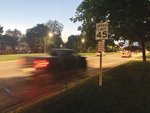



Jules Vander Galien often compares the streets of Lansing to a scene from a “Mad Max” movie.
Hordes of ATVs, motorcycles and modified cars are almost constantly racing and ripping through major thoroughfares and once-quiet neighborhood blocks. Stop signs and red lights, particularly in recent months, seem to be more a suggestion than mandate. The noise builds in the evening — especially as firework season in Lansing continues past the Fourth of July.
Vander Galien crafted a new name for the troubling (and noisy) phenomenon: “Aural assault.”
Vander Galien, 66, has lived in northwest Lansing for more than 15 years. And for the last several, that constant buzz of engine and exhaust noise has only ramped up her stress levels.
“My partner has chronic fatigue syndrome and she’s highly sensitive to these sounds,” Vander Galien added. “Sleep is an issue. Stress is an issue. She just cannot deal — even with the volume on the TV. I’m her caregiver, so this is becoming a really stressful, difficult situation.”
Even with gun violence also on the rise, the comparison between the Capital City and the level of sheer barbarity portrayed in the post-apocalyptic Australian action film series “Mad Max” is a bit of a stretch, Vander Galien admits. But her neighborhood near Groesbeck Golf Course is still becoming unbearable.
“It’s just constant, unyielding noise,” she added. “I’ve never seen it this bad in Lansing, and it just seems to be getting worse. We all need to address the issue and get this figured out quickly.”
Dozens of residents also reached out to City Pulse on Facebook over the last week with similar experiences. Multiple City Council members also said traffic safety — and noise — is the most frequent complaint from their constituents. The common thread: It all seems to be getting worse.
“There has been a constant drumbeat of complaints, but there has certainly been a crescendo in recent months,” said Council Vice President Adam Hussain. “Along with public safety and infrastructure, this is absolutely on the top of the list of things that we’re hearing from folks.”
Added Council President Peter Spadafore: “I’ve certainly seen plenty of emails on this issue. I’d say it’s among the top five concerns I hear, maybe second only to fireworks. It ebbs and flows based on the season, and we seem to hear much more about this during the summer months.”
Lansing Police Department records also vividly showcase the community concerns. Between 2016 and 2019, LPD conducted an annual average of 6,752 traffic stops. In 2020, local cops conducted 3,577 traffic stops amid the pandemic — about a 48% decrease from 2019.
And so far this year, LPD has only conducted 434 traffic stops, according to city officials. That sets pace for a record-low annual total of fewer than 1,000 traffic stops and even fewer tickets.
The city’s primary response plan: More cops. More enforcement. More visibility on local streets.
“Lansing residents are concerned about the dangers that come along with speeders on main roads and neighborhood roads, and are asking for police patrols,” according to a statement from Mayor Andy Schor’s office. “This is one of the reasons that the mayor proposed adding more officers, and is actively filling vacancies, in order to increase the number of police on patrol.”
Schor said plans to hire five new officers — and fill 15 other vacancies — by February will help mitigate ongoing traffic safety issues on neighborhood streets. Council members are also pushing for more speed bumps, traffic circles, speed wagons and other traditional solutions.
The conversations involve a search for innovative new answers to a longstanding problem, while also delicately balancing whether more cops should be part of the response.
Councilwoman Kathie Dunbar has been working with city officials to keep traffic signals active all night long on Martin Luther King Jr. Boulevard instead of switching to flashing yellow lights. Since those roadways are controlled by the state, any changes are out of the city’s jurisdiction.
Hussain said a “perfect world” would include working more with the state to reduce speed limits on certain roadways and add signage, speed bumps, traffic islands, roundabouts, speed trailers — along with more police officers stationed on city streets.
“This hasn’t been an incredibly popular idea, but maybe we should be working with the state to take another look at things like automated enforcement cameras,” Hussain added. “We don’t always need officers, but beefing up patrols with a more visible presence can play a role too. The truth is, we need that enforcement element too. Children’s lives are literally at stake.”
Some states — but not Michigan — allow automated enforcement of speed and red-light violations using cameras owned by private companies. State law only allows for tickets if cops actually observe the violation, investigate a crash or are otherwise authorized by a prosecutor.
Spadafore said the addition of new bike lanes could also serve as a deterrent for speeding, narrowing traffic lanes and forcing drivers to take more care in navigating local neighborhoods.
“I still think the biggest thing we can do is have a larger law enforcement presence,” he said. “I’m not unsympathetic to the calls to reform public safety, but the number of officers we have on the street right now just isn’t enough to do much more than be reactive and respond to calls.”
Council members Carol Wood, Patricia Spitzley, Brian Jackson, Jeremy Garza and Brandon Betz didn’t respond to questions from City Pulse about how local concerns should be handled.
Last April, law enforcement agencies across the country began to relax enforcement on speeding and other minor violations as the coronavirus continued to spread. State officials had also reported a significant reduction in traffic volumes, skewing any reliability on traffic stop data alone to indicate whether the rate of speeding and equipment violations was climbing or falling.
Local data simply shows that significantly fewer people have been pulled over in Lansing. And based on neighborhood complaints, the city seems to be charting out a worsening problem.
Reports of widespread speeding and reckless driving started pouring in early last summer — reportedly leading to a disproportionate number of speed-related crashes and fatalities nationwide. LPD officials couldn’t immediately provide any local crash data for Lansing.
Michigan State Police officials reported last month a 22% reduction in traffic crashes from 2019 to 2020 while also tracking a 10% increase in speed-related deaths in the same timeframe — a sign that speeding and reckless driving remained an issue, even with fewer drivers on the road.
Last July, former Lansing Police Chief Daryl Green announced a new policy: Local cops could no longer (and still cannot) initiate traffic stops for defective equipment violations — including cracked windshields, broken tail lights, tinted windshields and perhaps most notably, loud exhaust.
Accounting for about 15% of traffic stops annually, the change was billed as a way to reduce unnecessary contact with police and to curb any police discrimination against Black citizens.
In the six months that followed that announcement, city records show that local cops had conducted about 1,800 traffic stops and issued about 1,200 tickets for traffic or equipment violations — equating to roughly the same rate as the six months before the policy change.
And by last September, Schor appeared ready to start cracking down on increasingly dangerous roadways with the announcement of “Operation Slowdown” — a direct response to complaints that redirected patrols to more aggressively target and ticket reckless drivers and speeders.
Since its inception, officers assigned to the initiative have conducted 278 traffic stops and issued 263 citations for things like speeding, improper passing, running red lights and more. A spokesman said the focus is “along primary roadways” in the “afternoon and evening hours.”
The Police Department as a whole also conducted about 1,700 traffic stops and issued 1,400 tickets in the five months that followed that announcement — representing an 87% increase in traffic stops and an 82% jump in tickets issued compared to the five months that preceded it.
The LPD also joined forces with the state Office of Highway Safety and at least 30 other police agencies in yet another regional speeding enforcement campaign for two weeks last month. Acting Police Chief Ellery Sosebee said those efforts are set to be “renewed” again later this year.
“The department takes all traffic complaints from citizens of Lansing seriously,” according to an LPD spokesman. “Several complaints are quality of life issues, not only driving safety but neighborhood peace and quiet. Follow-up is the essential key to addressing these complaints.”
Residents can also visit lansingmi.gov/calmingpetition to lobby city officials for new traffic calming measures in their neighborhoods. The proposed area must be a minimum of one block and the online petition form requires signatures from at least 25% of the nearby households.
Support City Pulse - Donate Today!
Comments
No comments on this item Please log in to comment by clicking here